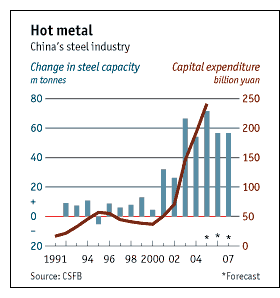

|
| weblog/wEssays archives | home | |
|
Inflation/Deflation III: The Limits of Deflation (January 10, 2007) On my first visit to China in June 2000, I was surprised to read that overproduction of television sets had driven prices below costs, and manufacturers were teetering on bankruptcy: TV Overproduction Leads to Price War (2000).  As this article describes, the government stepped in to fix prices above break-even, but
no one in the industry expected this to hold.
As this article describes, the government stepped in to fix prices above break-even, but
no one in the industry expected this to hold.
This meant that China was already producing more TVs in 2000 than either the domestic or export market could absorb. So much for U.S. pundits who think China can live without export markets; they are already producing everything far in excess of what their domestic market wants or can afford. Every Chinese family already had a TV in 2000, and everyone who can afford one has a cell phone, too. Welcome to Marx's vision of unbridled Capitalism: stupendous overproduction leads to relentless price cutting which leads to widespread bankruptcy among producers as every market is saturated with goods nobody wants or can afford. Marx correctly described the endgame of price wars: monopoly capital, in which a small handful of surviving producers control each sector market. Here's a news story on overproduction of cell phones back in 2003; inventories of domestic (Chinese) manufacturers were estimated at 20 million phones--never mind Motorola and Nokia's inventories: New rule to curb mobile-phone overproduction (2003).  Next up, steel: same story, only more so: 80 million tons of oversupply--again, just
domestically. How about all those nations who've counted on supplying China with steel?
Throw in non-Chinese capacity, and overproduction probably reaches 180 million tons annually:
Overproduction risks loom large in China: expert (August 2006)
Next up, steel: same story, only more so: 80 million tons of oversupply--again, just
domestically. How about all those nations who've counted on supplying China with steel?
Throw in non-Chinese capacity, and overproduction probably reaches 180 million tons annually:
Overproduction risks loom large in China: expert (August 2006)
Over the past six years, the real estate market absorbed nearly 60 percent of iron and steel products. China's iron and steel output for the 2006-2010 period is expected to reach 250 million tons, which would translate into an oversupply of more than 80 million tons, he said.Here are two stories from the People's Daily English language webpage (I had trouble loading these, but give them a try; maybe "The Great Firewall" is overloaded): Government study says 11 Sectors Threatened by Overproduction. Auto Industry Facing Grave Overproduction. What's ironic about the auto overcapacity is that every major auto company in the world rushed to build factories in China for the domestic market, and now, guess what: the capacity far outpaces domestic demand for the foreseeable future. This is the engine of deflating prices: global overproduction on a gargantuan scale. But even with overproduction running rampant, there are limits, and that's what I want to focus on.  It's well known that China has long subsidized its government-owned factories with "loans"
which cannot be repaid. But even the central government's purse is not unlimited,
and China has been closing or selling off these outdated dinosaur factories as rapidly as
possible. (See China: An Interim Report
for more on China's economy.)
It's well known that China has long subsidized its government-owned factories with "loans"
which cannot be repaid. But even the central government's purse is not unlimited,
and China has been closing or selling off these outdated dinosaur factories as rapidly as
possible. (See China: An Interim Report
for more on China's economy.)
In other words, the Chinese government is now willing to let companies go bankrupt. The game for the central government is to keep export markets growing so they can absorb the ever-greater production of China. But a U.S. recession will throw cold water on the fire: their largest single market will spin into declining demand. This will present an insoluable problem, for Chinese factories are already running at razor-thin margins of 5% or less. (As reported in BusinessWeek: Rising Wages Spell Trouble in China. See also my entry, Trade with China: We're Making Out Like a Bandit.)  The net result: a price cut of only 6% puts Chinese manufacturers in the red--and heading
straight for bankruptcy. Chinese entrepreneurs are not foolish; they are not going to
run their businesses at a loss. Some global Japanese corporations have been known to absorb
losses for years to build market share or drive competitiors from the market, but these
companies are extremely well-capitalized and enormously profitable; they can afford to take
the long view. Chinese companies have neither luxury.
The net result: a price cut of only 6% puts Chinese manufacturers in the red--and heading
straight for bankruptcy. Chinese entrepreneurs are not foolish; they are not going to
run their businesses at a loss. Some global Japanese corporations have been known to absorb
losses for years to build market share or drive competitiors from the market, but these
companies are extremely well-capitalized and enormously profitable; they can afford to take
the long view. Chinese companies have neither luxury.
Here in the U.S., prices dropping in restaurants and nail-salons is divined as proof of deflation. But there are limits to price deflation in the U.S., too. Our friends own a restaurant, and used to own two until costs forced then to close one. Restaurants, nail salons, airlines--they all operate on the same principle: your fixed costs are high, so you need to fill a certain number of seats to make your nut, i.e. cover your expenses. Every seat beyond that number is profit. Let's say a restaurant has to serve 300 meals a day at $10 each to cover rent, utilities, employees, TDI, workers compensation, liability insurance, marketing, etc. Now if a recession darkens the land, customers become scarce. If our restaurant owner cuts prices 20%, then they have to serve 375 meals to break even. Customers cut back on liquor, desserts, beverages--all your profit centers. As business gets tougher, you actually have to bring in more customers--basically taking them from competitors, who might well respond by cutting their prices. As losses mount, restaurants are forced to close. You can only keep the doors open as long as your savings (or credit lines) hold out. Once that's gone, you have no choice but to close. One restaurant--the best capitalized, the one which can afford the best marketing, and so on--will remain in each sector, but the rest will be gone. Then the remaining restaurant(s) can raise prices again. Why not? The entry costs are steep, and who is crazy enough to risk opening a business in a recession? The fixed costs are high, even in a declining business climate. Rents don't drop much, and neither do wages, taxes, insurance, etc.) (If you know a commercial landlord who will rent a restaurant space for next to nothing, please let me know. That would be smart, in the long-term, but the majority of commercial landlords will let a space languish empty for years rather than accept a major rent reduction.) The point: price cuts--and thus deflation--will only endure until price wars eliminate the vast majority of competitors. The few survivors will benefit from the same power that all monopoly capital wields--price increases and profitability. While assets may deflate in value for years, consumer prices cannot. Once price wars and losses eliminate most competitors, the survivors must stabilize prices or go under themselves. We need to be careful to specify whether we are measuring asset deflation or deflation in the price of everyday consumer goods. The two are very different. Here are some related entries on China you might want to read: China Irony: Steel, Marx, and Monopoly Capital Will the Housing Bubble Take Down China? Hot-Air Dragon: Is China About to Pop? Astute reader Jill M. sent in this correction to Aaron K.'s commentary yesterday: His mention of the Plaza Accord is quite off base.Thank you, Jill, for setting the record straight on a key slice of economic history. For more on this subject and a wide array of other topics, please visit my weblog. copyright © 2007 Charles Hugh Smith. All rights reserved in all media. I would be honored if you linked this wEssay to your site, or printed a copy for your own use. |
||
| weblog/wEssays | home |